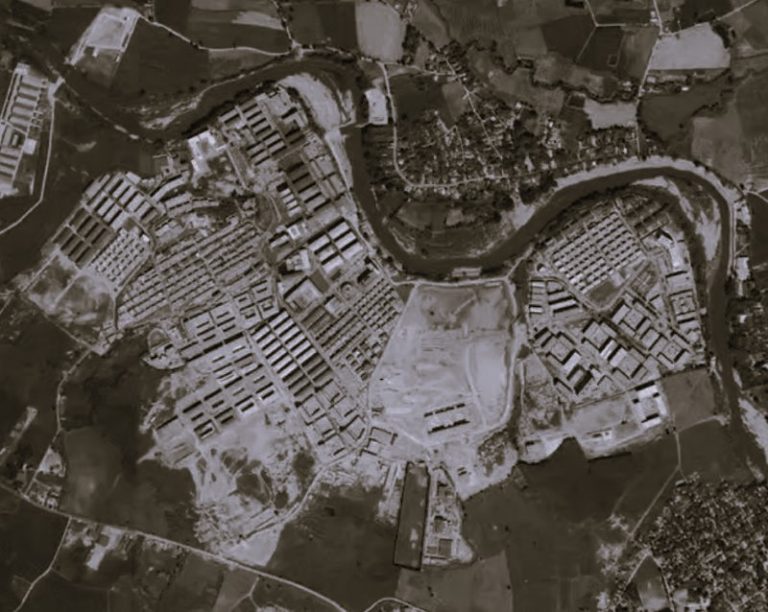
Helen knows both how to spot an ambush in the making and how to tell a great ambush story.

By Dr. Mary Ebbott
Professor of Classics
College of the Holy Cross

By Dr. Casey Dué Hackney
Professor of Classics
University of Houston
Introduction
In addition to her superlative beauty, Helen in the Iliad and Odyssey has exceptional talents. She recognizes Telemachos before anyone else in Sparta does (Odyssey 4.138–146). She can also recognize a goddess in disguise (Iliad 3.396–399). She can interpret bird-signs like a mantis (‘augur, seer’) (Odyssey 15.171–178). She knows her life will be the subject of future song (Iliad 6.356–358). She can tell the story of the Trojan war herself in her weaving (Iliad 3.125–128). She performs a beautiful lament for Hector (Iliad 24.761–776). Displaying the skills of both seer and poet, Helen has special insight and a way with words; she is a speaker of truth (Odyssey 4.140, cf. Iliad 3.204). Here we will add two skills that she has not received enough credit for: Helen knows both how to spot an ambush in the making and how to tell a great ambush story.
In our book Iliad 10 and the Poetics of Ambush (2010), we demonstrated that ambush is an important and frequent theme in Homeric epic, defining theme as Milman Parry and Albert Lord did as a “[group] of ideas regularly used in telling a tale in the formulaic style of traditional song” (Lord 1960/2000:68). A theme is a way of organizing, expressing, and understanding an element of the larger song. We identified components that define and indicate the ambush theme (for which we use the term lokhos), and the ways in which it is set in opposition to the theme of daytime battle (polemos) (see especially Dué and Ebbott 2010:31–87ad loc.). One of our findings was that this theme encompasses several types of “ambush” stories, such as the spying mission or the cattle raid, which share certain elements and formulaic language. These commonalities allow one of kind of ambush story to easily slide into becoming another. A prime example of these multiple aspects of the ambush theme is the story that Helen tells about Odysseus in Odyssey 4.235–264. As Helen relates the story, during the war Odysseus infiltrated Troy on a spying mission. Once he has collected his reconnaissance, his mission becomes an ambush, when he kills many Trojans on his way out of the city (see Dué and Ebbott 2010:80–82). Here, in honor of Helen, we would like to consider this story from a different vantage point, focusing on Helen as the storyteller and also as a character both in her own ambush story and in the ambush story Menelaos tells in response to hers.
Helen as a Storyteller
Helen is like both Achilles and Odysseus in that she is both a subject of song and a singer of tales. All three star in and are well-versed performers of the full range of epic genres. Odysseus is a master of mētis (‘cunning intelligence,’ ‘craft’) but can also be a promakhos anēr (‘one who fights in the front line of battle’). Achilles is first and foremost a spearman and exemplifies biē (‘force’), but his superior ambush skills are attested throughout the Iliad by various characters (Dué and Ebbott 2010:42–44). Achilles sings the klea andrōn (‘the glorious deeds of men’) with Patroklos (Iliad 9.189), no doubt very manly tales of cities sacked and women taken captive. But he also laments like a captive woman over the body of Patroklos when his closest comrade dies. Odysseus is a master storyteller of ambush tales in Odyssey 9–12 and in his Cretan lies in the second half of the Odyssey, but he can also sing about the polemos and the sack of a city (e.g., that of the Kikones at 9.37ff).
As a storyteller, Helen is as versatile as these premier Homeric heroes and as the Homeric epic tradition itself. In the Iliad, an epic full of battle stories, she weaves a polemos theme: “she was weaving the many struggles [aethloi] / of the Trojans, tamers of horses, and the bronze-khitoned Achaeans, / struggles which for her sake they were suffering at the hands of Ares” (Iliad 3.126–128). In the Odyssey, an epic that celebrates the cunning, ambush-style fighting of its hero, her story—still about the aethloi of heroes—uses a lokhos theme instead.
234 Picking up the conversation [muthos] once more she addressed them:
Odyssey 4.234–264
235 “Son of Atreus, Menelaos nurtured by the gods, and you men here,
236 sons of good men: truly the god in different ways to different people,
237 Zeus, that is, gives both good and bad, for he has the power to do it all.
238 But for now, sit here and dine in the halls
239 and enjoy stories [muthos], for I will give you an account that seems right.
240 I could not tell [muthos] nor name everything,
241 the many struggles [aethloi] that were Odysseus’s with his enduring heart,
242 but this is an example of what the powerful man did and dared
243 among the Trojan people, when the Achaeans were suffering pains.
244 He subjected himself to hideous blows,
245 threw shabby clothes around his shoulders, looking like a servant,
246 and sank into the city with wide streets belonging to hostile men.
247 As disguise he made himself look like another person,
248 a beggar, the sort who would never be at the ships of the Achaeans.
249 Looking like this he sank into the city of the Trojans, and they paid him no attention—
250 all of them—but I alone recognized him, even as he was,
251 and I questioned him thoroughly, but he evaded me with his cunning.
252 But when I bathed him and rubbed him with oil,
253 and placed clothes around him and I swore a powerful oath
254 that I would not expose Odysseus among the Trojans
255 before he arrived at the swift ships and tents,
256 then he gave a full account of the Achaeans’ intentions.
257 After he killed many Trojans with his long sword
258 he went to the Argives, and he brought back a lot of intelligence.
259 Then other Trojan women wailed with piercing cries, but my heart
260 was pleased, since already my heart was turned toward returning
261 home again, and I regretted the derangement which Aphrodite
262 gave when she led me to that place away from my dear fatherland
263 and I abandoned my child and bridal bedroom and husband,
264 who is inferior to no one in either wits or looks.”
Helen the storyteller first signals that her story will involve ambush through the epithet “Odysseus with his enduring heart” (Ὀδυσσῆος ταλασίφρονος, Odyssey 4.241)—endurance is a characteristic necessary for a successful ambush (Dué and Ebbott 2010:74–75). That indication is reinforced by the detail that Odysseus conducted his spying mission “when the Achaeans were suffering pains,” (Odyssey 4.243), because ambush tactics are used to gain an upper-hand when you are currently losing or outnumbered or have found no other way of winning. Helen quite naturally tells a story that she was an eye-witness to, making her an authority on what happened. But we shouldn’t let that detract from her special status as a storyteller within the epic tradition and beyond. The tale that Helen tells here closely resembles an episode that has been reported by Proklos as included in the so-called Little Iliad in the Epic Cycle (attributed in antiquity to Lesches of Mytilene):
Odysseus, disfiguring himself, goes into Ilion as a spy.
(translation by Gregory Nagy)
He is recognized by Helen;
jointly, they plan the capture of the city.
In telling a first-person version of a tale that ultimately becomes part of the larger epic tradition, Helen once again resembles Odysseus. Each is the ultimate authoritative source for their own story. Odysseus’s tale, because he is the only one of his companions to make it home, cannot be contradicted by any authoritative source. Helen’s, interestingly enough, could only be contradicted—or corroborated—by Odysseus, who is nowhere to be found at this point in the Odyssey.
A thousand years or more after the Iliad and Odyssey took shape in the form in which we now know them, Helen is still remembered as a singer. In the Hērōikos of Philostratus, we are told that Homer learned all that he knew by consulting the spirit of Odysseus himself (Philostratus, On Heroes 43.12–16), and that Achilles was given musical skill by the Muses (45.5–7). But at the end of that dialogue, we find out that Achilles has a singing partner in the afterlife, and it is Helen (54.12–55.3).
Helen as a Character within the Ambush Stories
As a character in her own ambush story (and as we will see, in her husband’s as well), Helen proves to be an excellent counter-ambusher. Helen’s powers of recognition and of seeing through disguise that she demonstrates elsewhere in Homeric epic are on display in her story as well. She alone can recognize Odysseus in his disguise (Odyssey 4.250) and even tests him through questioning. Just as Diomedes and Odysseus get the drop on Dolon and make his spying mission unsuccessful in Iliad 10, within her story Helen has the power to obstruct Odysseus’s mission and even expose him. As narrator she tells us she did not do so. But how did Helen get this opportunity to see and question Odysseus in the first place?
The compressed narrative in Helen’s story leaves it to us to fill in how we get from Odysseus disguising himself and getting into Troy to his being in Helen’s presence. The similarities of this story to Odysseus’s infiltration of his own home, occupied by the suitors, in the Odyssey provide a possible way to imagine it. Odysseus poses as a beggar on Ithaca as a way to get into the noble household—hospitality will allow him entrance and an opportunity to be present during the meal. So did Odysseus use this same strategy in Troy? As a beggar, he obtained entry into the Trojan royal household and even into their dining room. Was he able to get some information just by overhearing what the men of the household (who we know from the Iliad were accustomed to go home at night after fighting during the day) spoke of during that meal? Imagine Helen at this same meal. That is where she first noticed who this beggar really was, unlike everyone else, as she says. Her power of recognition is the first example of Helen’s counter-ambush expertise: she notices what others do not, just as Odysseus is said to do in Iliad 10.247 (see also Dué and Ebbott 2010:287–288 ad loc.).
Helen then says she questioned Odysseus but he evaded her with his cunning. In other words, Helen tested whether Odysseus could keep up this disguise or whether he would give himself away, but he showed his own ambush skills of cunning and endurance. The next event in her story is her bathing Odysseus. How does that follow her questioning? Did Helen volunteer to give “the beggar” his bath so that she could be alone with him? Bathing is a regular part of the hospitality offered in Homeric epic, and this part of her story is reminiscent of the scene with Eurykleia in Odyssey 19. There Penelope questions the stranger/beggar, but it is Eurykleia who is asked to bathe him, at Odysseus’s own request (Odyssey 19.317–360). Eurykleia recognizes him by his scar, and when she seems on the verge of telling Penelope, Odysseus threatens her not to expose him (Odyssey 19.467–490). The two of them are alone in this scene, and so, it would seem, are Helen and Odysseus in her story when she bathes him. Once they are alone, Helen could let on that she recognizes him, and in this case he exacts from her an oath that she will not expose him before he safely returns to the ships. Helen says that he then told her everything that the Achaeans were thinking. Is the implication that they traded intelligence, since he returned with a good deal of it as well? If Helen does have information about Trojan plans (or weaknesses), it seems that she and Odysseus collude here in exchanging information, just as in the Little Iliad episode.[1] Helen’s story portrays her as a double-agent, ostensibly on the Trojan side but secretly happy that Odysseus succeeded.
Helen’s ambush story is, of course, answered immediately by an ambush story told by her husband. Menelaos’s story focuses on the most famous ambush attack in the whole of the Trojan war, that of the Trojan horse, which he even refers to as a “hollow lokhos” (Odyssey 4.277). His story also stars “Odysseus with his enduring heart” (Odyssey 4.270), and indeed Odysseus’s endurance is on display during this particular ambush as the men wait inside the horse and cannot come out too soon. In this story, it is once again Odysseus versus Helen as to whether she will expose the ambush.
265 Then golden-haired Menelaos answered her and said
Odyssey 4.265–289
266 “Yes, my wife, you have said all these things in good measure.
267 Already I have learned the plans and intentions of many men,
268 heroes, and I have traveled over much of the world.
269 But I have not yet seen with my own eyes such a man
270 as my dear friend Odysseus with his enduring heart was.
271 This is also an example of what the powerful man did and dared,
272 inside the wooden horse, when we sat within, all the best
273 of the Argives, bringing death and destruction to the Trojans.
274 At that time, you came to that place: a daimōn must have urged you,
275 a daimōn who wished to grant radiant glory to the Trojans,
276 and godlike Deiphobos followed you as you came.
277 Three times you walked around the hollow ambush, touching it,
278 and you called for the best of the Danaans by name,
279 likening your voice to the wives of all the Argives.
280 And then I and the son of Tydeus and radiant Odysseus
281 sitting within the middle of the horse heard as you shouted.
282 The two of us were eager to start up,
283 either to come out or to answer back from within,
284 but Odysseus held us back and stopped us, as much as we wanted to.
285 Then all the other sons of the Achaeans were silent
286 but Antiklos alone answered you with words—
287 well, he wanted to. But Odysseus clamped his hands over his mouth,
288 his powerful hands, and he didn’t let go. He saved all the Achaeans.
289 He held on until Pallas Athena led you away again.
Menelaos recalls Helen (with her then-husband Deiphobos in tow) appearing in the place where the horse was standing. What made Helen come to the horse and call out for the best of the Achaeans? Did she understand the ambush nature of the horse? Menelaos diverts blame to some unnamed divinity (daimōn), but also describes another power that Helen has, to make her voice like those of the warriors’ own wives (Odyssey 4.278–279). Gregory Nagy has recently suggested that Helen is using the poetic art of the Muses as she calls to the Achaeans: “Helen’s voice, borrowed from the poetry of the Muses, has the power of conjuring the voices of the wives themselves. And, by extension, her poetic voice has the power of conjuring the very images of the wives,” (Nagy 2015:2§27). Helen the character in Menelaos’s story thus exhibits the power of Helen the storyteller we have seen in Homeric epic and beyond. Helen’s poetic art and her counter-ambush tactics operate together. It seems that she did know, or at least suspected, that the Achaeans were inside the horse, and she was very close to getting them to reveal themselves too soon and thus for the ultimate ambush of Troy to fail. Odysseus saves the day, but Helen had the insight into what the horse really was, as well as the best way to appeal to the warriors inside, tempting them via her poetic performance to disclose the ambush trick that the horse contained.
Much could be (and has been) said about how these two stories differ in their depiction of Helen’s allegiances during the war, and what this exchange suggests about the current marital relationship between Helen and Menelaos. What the two stories have in common, though, is what we are emphasizing here. In both stories, Helen is the only one in Troy who can match wits with Odysseus when it comes to ambush tactics. We think her cousin Penelope would be proud.
Appendix
Notes
- What does Odysseus look like after Helen bathes him and gives him different clothes? Is he now too recognizable, since much of his disguise has been altered? Perhaps that is why he kills many Trojans on his way out of the city—he has to fight his way out instead of sneaking out. Or perhaps his killing had to do with the intelligence he gathered, as the deaths of the newly arrived Thracians in Iliad 10 are the result of the intelligence that Odysseus and Diomedes get from the Trojan spy Dolon.
Bibliography
- Dué, C. and Ebbott, M. 2010. Iliad 10 and the Poetics of Ambush: A Multitext Edition with Essays and Commentary. Hellenic Studies Series 39. Washington, DC: Center for Hellenic Studies. http://nrs.harvard.edu/urn-3:hul.ebook:CHS_Due_Ebbott.Iliad_10_and_the_Poetics_of_Ambush.2010
- Lord, A.B. 1960/2000. The Singer of Tales. 2nd edition. Cambridge, MA: Harvard University Press. http://chs.harvard.edu/CHS/article/display/5595
- Nagy, G. 2015. Masterpieces of Metonymy: From Ancient Greek Times to Now. Hellenic Studies Series 72. Washington, DC: Center for Hellenic Studies. http://nrs.harvard.edu/urn-3:hul.ebook:CHS_Nagy.Masterpieces_of_Metonymy.2015
Originally published by The Center for Hellenic Studies, 05.01.2016, under a Creative Commons Attribution-NonCommercial-NoDerivs 3.0 Unported license.







